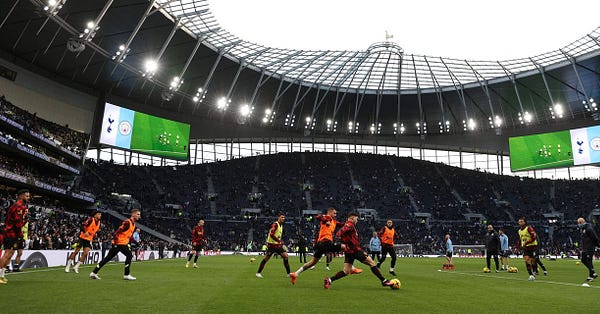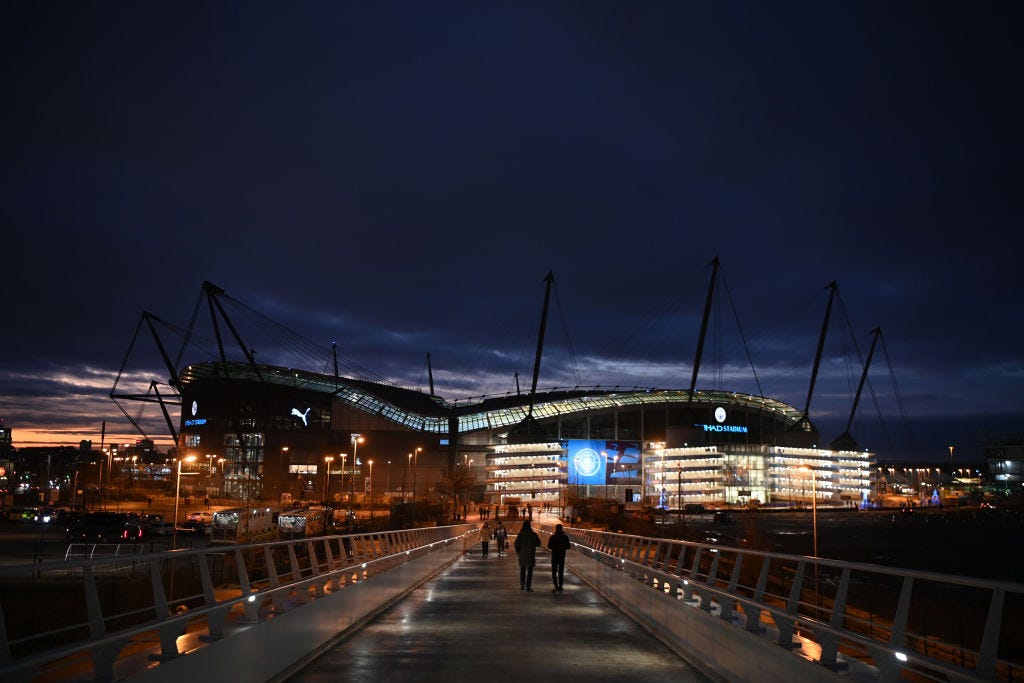⚽ Financial fair play?
Manchester City charged and why it matters + Britishvolt + innovation in rugby
Hello and welcome to the latest edition of Off to Lunch…
The Premier League has charged Manchester City with more than 100 alleged breaches of its financial rules. If Man City is found guilty of these charges then the football club could face a points deduction or even relegation.
This is a sports story, but it is also a business story, because the allegations involve how and where Man City City was accounting for revenue and costs, and a string of other organisations are involved in that too. Also, the football club and its Abu Dhabi owners have been at the heart of a remarkable regeneration story around the area where Man City’s stadium is in east Manchester, investing heavily in the local community.
The charges relate to alleged offences between 2009 and 2018…






Man City have denied allegations in the past that they have breached financial rules. These rules are designed to ensure that a football club’s spending does not dramatically exceed its income.
The German publication Der Spiegel has reported extensively on Man City’s financial dealings as part of an investigation with the European Investigative Collaborations (EIC) network. It has said the allegations involve accounting for sponsorship revenue from Abu Dhabi-based companies when it was actually money from Man City’s owner, who is ultimately Sheikh Mansour bin Zayed Al Nahyan, part of the Abu Dhabi ruling family. The allegations also involve paying former manager Roberto Mancini off-books through a different entity and attempting to sign young players by offering financial incentives.
All these allegations could raise questions for BDO given that it audits Man City and the football club formally files accounts at Companies House.
For more on the background and history to all this I recommend this by The Athletic, which has looked at the ownership structure of Man City and the sponsorship deals.


Even The Wall Street Journal has deemed this story worthy of a breaking news alert. A sign of the growing interest in the Premier League in the US, but also the financial implications of the allegations…


It could take some time for this case to develop further given Man City have denied allegations in the past, years even. But this is a story to watch…
Other stories that matter…
Some other news to tracks this week: BP is expected to post bumper annual profits on Tuesday and at the same time could announce it is reducing its plans to invest in renewable energy. Also on Tuesday, the chief executives of Lloyds and Natwest and the UK bosses of Barclays and HSBC face MPs to answer questions about the interest rates they are charging households and businesses. AstraZeneca, the drugs group, is among the other big UK companies to be reporting results this week, that’s on Thursday. On Friday we will find out if the UK avoided entering a recession at the end of 2022 because we get the GDP figures for December and the final quarter of the year from the Office for National Statistics. Here is a thorough preview of those GDP numbers from the Financial Times (FT)
The Manchester-based property developer Bruntwood, which specialises in regeneration projects across northern England, has posted a 68 per cent increase in pre-tax profits to £75.2 million for 2022. The value of its property portfolio rose by more than 10 per cent to £2 billion. Levelling-up doesn’t just benefit towns and cities, it’s profitable for businesses too (Bruntwood)
A 20-year-old entrepreneur, Sarbjot Johal, is close to securing a deal to buy Morecambe football club. Johal would be the youngest owner of a professional football club in England. He is thought to have earned his wealth through two drinks brands and Sarb Capital, an investment firm, although details about the drinks and Sarb are scarce online (Daily Mail)
Jeremy Hunt, the chancellor, wants the government to work on a nationwide database of petrol prices to stop consumers from being ripped off and help them find the best price. Petrol stations would have to submit their prices to some sort of central body. To be honest, this sounds similar to what the PetrolPrices app does already. You can download that here (The Times)
Australian company Recharge Industries has been named by administrators as the preferred bidder to buy the collapsed Britishvolt, the business behind plans for a gigafactory in Blyth, Northumberland, that would make electric car batteries (BBC)
Amazon is closing shops across the world as it struggles to find a bricks-and-mortar format that works. It has just closed its Amazon Fresh grocery shop in Dalston, East London, for instance. The shops were part of a push by Amazon to expand the brand and have locations close to where people live. Andy Jassy, Amazon’s chief executive, said last week that he had halted openings of new Fresh stores and wants to experiment with shop formats to “try to find a format that we think resonates with customers, that’s differentiated in some meaningful fashion, and where we like the economics”. A problem with the UK stores is that for all the technological wizardry inside - you get charged for a product just by taking it off the shelf - they are difficult to get into. You always see a handful of people outside the shop trying to download the app that you need to get inside. Once you have the app, you still need to sign-in, generate a QR code on your phone and swipe-in to get into the shop. Is that really convenient? Anyway, The Information has done a big piece on Amazon’s struggles with shops and what has gone wrong (The Information)
Interesting piece on ChatGPT and six things you didn’t know about AI technology. This includes how Microsoft’s Bill Gates and Google co-founders Larry Page and Sergey Brin are excited and are spending time with their old companies working on it (Forbes)
The profile of hedge fund boss Michael Platt that I linked to last week included lots of references to ego, specifically the importance of not having one so you can make better decisions and recognise when you are wrong. This skill has come up a lot recently and is a big feature of this piece on the Philadelphia Eagles, the first NFL team to reach the Superbowl twice in five years with a different coach and quarterback. One of the reasons the Eagles were able to do that is cutting their losses quickly on bad decisions and thinking long-term (Go Long)
Finally, check out Off to Lunch’s Sunday press review for a round-up of the weekend newspapers, including the return of Liz Truss, Arm’s potential float and the sale of Trunki. Paying members were sent this yesterday, click here to sign-up and get next week’s edition.
And finally…
As you know, I am interested in what business and sport can learn from each other on decision-making, strategy, innovation and more. In terms of innovation, an interesting recent trend has emerged in rugby and was evident during the first weekend of matches in the Six Nations - greater use of the tap-and-go penalty. This is when a player chooses to take a quick penalty and keep the ball themselves rather than elect to kick the ball out of play for a line-out, take a scrum, or kick for goal to get three points. England chose to go for a tap-and-go near the try-line early in their match against Scotland, prompting the commentator to note that this was “being used increasingly in the game”. This decision led to England’s first try.
Until recently the conventional wisdom has been that if you are close to the try-line you should either kick for goal or, if you want a try, have a scrum or line-out. This is because a scrum and line-out involve all the forwards being bunched together and the backs can spread out across the pitch, potentially giving them a greater chance to score. However, the downside of this is that the team has to win the scrum or line-out. In the Wales v Ireland match, for instance, there were numerous occasions where Wales chose a line-out but then botched it and lost the ball.
The downside of the tap-and-go is that it was considered a bit static, slow and predictable - you know which player has the ball and will restart play. However, it has advantages - you are guaranteed to keep the ball and the opposition has to back-off ten meters. It appears that some teams have decided those advantages and the low-risk can outweigh the higher-risk approach of the scrum and line-out.
I suspect this will be an area in rugby that sees more innovation. For instance, teams could design flamboyant set-moves after the tap-and-go has been taken. As an example, check-out this recent play in Japan involving the brilliant South African scrum-half Faf de Klerk…

Sport is a hotbed for innovation, as I have said before, and the willingness to question conventional wisdom is something that businesses, entrepreneurs, and all of us really, can learn from…
Thanks for reading. If you enjoy Off to Lunch then please share it with others and spread the word. If this newsletter was shared with you then please sign-up below to become a member, get Off to Lunch sent directly to your inbox, attend our forthcoming events and contribute to the work of Off to Lunch
Best
Graham





